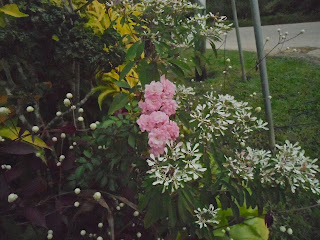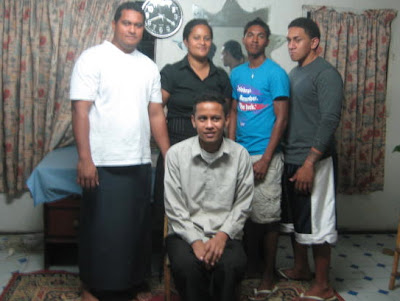 |
| Another senior missionary in front of one of our favorite flowering bushes. |
 |
| Keep in mind that the fence in front of the bush is about 6 feet high. I love the way the bush just grew right through the chain link. |
Flowers are planted purposefully, as well, and this amaryllis, which I photographed in March, finally succumbed to torrential rains in late August. The petals retained their delicate colors even after the blooms were on the ground. This was in the garden of the LDS church across the street from us.

This picture at right shows the plantings in front of the mission office building - my favorite plant is the bush covered in tiny white blossoms. Too bad the blossoms only lasted about 10 days. But what a wonderful fragrance!

And I love the way everything just grows together here. In this picture there are at least five different plants sharing the same square foot of soil. And they all seem to just thrive together.
 |
| The yellow leaves on the tops of plants are new growth - the leaf comes first, then the chlorophyll! And yes, that's a fallen coconut on the road. They're everywhere. |
The best plantings are in front of more established homes, where time has been the best ally to beauty. I love this garden - this family has no other place than the front balcony to hang up clothes out of the rain, but the beauty of the front garden is not diminished by the realities of daily living.

And families are not shy about planting in front of their properties, either - this roadside fence is a simply a defining line between two gardens, rather than a boundary of property.

But the biggest winter surprise has been the amazing number of poinsettias here on this tropical island. Red, white, and pink poinsettias are everywhere - some forming a wonderful hedge along the road, others just stretching up over other bushes (up to 8 feet in the air) and providing pops of red and white mixed in a hundred shades of green.
And then there are the giants. This is another senior missionary hiding behind a leaf of kape (kah-pay), a root crop. A field of kape fills up a lot of space in a hurry! And it invites certain senior missionaries to get silly...
 |
| The other giant leaves behind me are banana tree leaves. |
The four of us snapped pictures, posing as Ninja Turtles and other such, but just so we could fit in some classics, here I am as the fairy queen from Shakespeare's "A Midsummer Night's Dream!" Tah-dah!
The greens, reds, purples, yellows, and other colors of Tonga delight the eye and serve to remind me of the endless variety of beauty in this world. What a wonderful place - just like so many other wonderful places on this planet.





